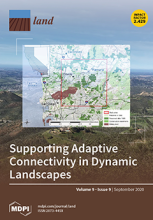Land Library Search
Through our robust search engine, you can search for any item of the over 73,000 highly curated resources in the Land Library.
If you would like to find an overview of what is possible, feel free to peruse the Search Guide.
/ library resources
Showing items 37 through 45 of 177.Rapid urbanisation in China has led to massive outmigration in rural regions, which has changed the regional labour force structure and can have various profound impacts as a result.
This study explores urbanization and flood events in the northern coast of Central Java with river basin as its unit of analysis. Two types of analysis were applied (i.e., spatial data and non-spatial data analysis) at four river basin areas in Central Java—Indonesia.
Papua New Guinea is a country in Oceania that hosts unique rain forests and forest ecosystems which are crucial for sequestering atmospheric carbon, conserving biodiversity, supporting the livelihood of indigenous people, and underpinning the timber market of the country.
Informal settlements in areas that are already disaster prone are an increasing problem. Climate adaptation is also often used as an excuse fo evictions to redevelop sites in a more climate-proof manner in what is often referred to as ‘climate gentrification.
Remotely sensed land cover data can be a tremendous resource to land use decision makers, yet there is often a disconnect between the worlds of remote sensing and local government. The Connecticut’s Changing Landscape project is focused on bridging this gap.
Demand for resources and changing structures of human settlements arising from population growth are impacting via the twin crises of anthropogenic climate change and declining human health.
The dilemma between preserving farmland and urbanization has attracted many policymakers’ attention. One sound solution that has been practiced in several developed countries is the “transfer of development rights” (TDR).
The aim of this study is to review the literature and provide a technical brief to the African Group of Negotiators Experts Support (AGNES) on the effect of climate change on livestock across the continent up to 2050, highlighting the adaptation needs and options.
Under the Paris Agreement, countries should update their Nationally Determined Contribution (NDC) every five years, with progressive ambition in each new submission. Kenya plans to review and revise its NDC in June 2020.







